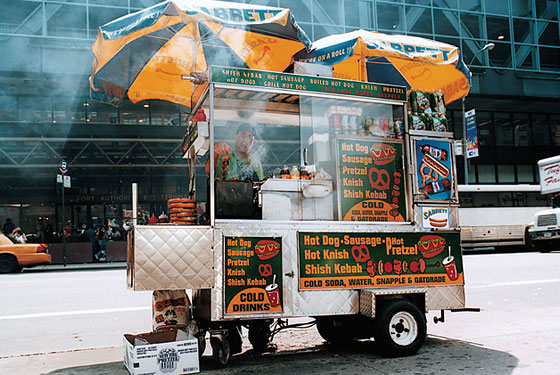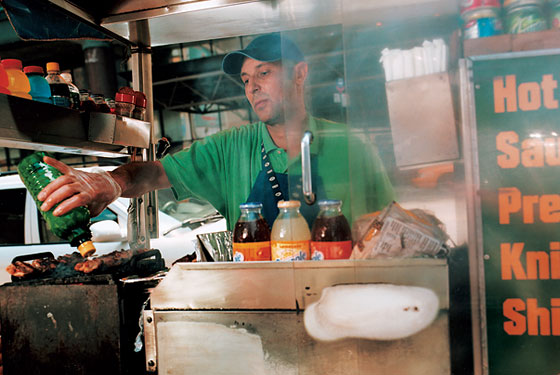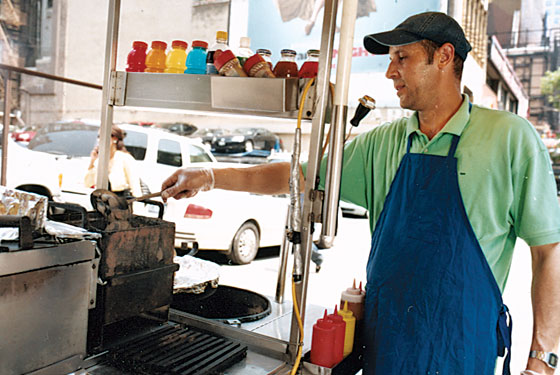
On a sunny Thursday morning, Hakim Elnagar is up at nine o’clock and out of his apartment—a two-bedroom walk-up in the shadow of Yankee Stadium that he shares with his wife and four children—by 9:30. Elnagar is a street-kebab vendor, and the leisurely wake-up time is a luxury in his world. His neighbor, a coffee-cart guy who calls himself German, wakes up at 2:30 a.m. From 161st Street, it’s a short train ride to the garage at Ninth Avenue and 39th Street where Elnagar keeps his cart—and from there, it’s just three blocks to his place of business: 42nd Street between Eighth and Ninth Avenues, prime Manhattan vending territory. It’s the same routine six days a week.
Today, Elnagar, an Egyptian-American who emigrated to New York eleven years ago, is at the garage by 10:10, exchanging salaam aleikums with other vendors. The garage, the gutted ground floor of a brownstone that’s home to a half-dozen carts, is run by a fellow Egyptian named Abdullah. Abdullah charges $200 a month per cart, and Hakim owns two (he operates one; a partner mans the other). The garage is more than a place to keep carts safe. In back, there’s a makeshift wholesale shop where cart men can stock up on their wares before heading out to the streets. A freezer chest is filled with hot dogs, and shelves are piled high with Admiration mustard and Trappey’s Louisiana hot sauce. There’s also a giant shower booth where carts get hosed down. Abdullah’s cousin, Mohammed, lounges at the shop’s entrance with a prehistoric calculator and handwritten ledger in which he records the vendors’ tabs.
Elnagar operates a stretch version of the basic hot-dog cart, with the dogs de-emphasized in favor of the kebabs. It’s eight-and-a-half feet long, close to the maximum allowable size, and includes a hot-water tank for hot dogs, a cooler for ice and soda, a dry shelf for pretzels, and a twelve-by-twelve-inch charcoal grill. It takes two Sabrett umbrellas (WE’RE ON A ROLL!) to cover it. Its front and sides advertise, in peeling letters, SHISH KEBAB—HOT SAUSAGE—BOILED HOT DOG—GRILLED HOT DOG—PRETZEL—KNISH—COLD SODA—WATER—SNAPPLE. Mounted over the grill and facing inward, where only Elnagar can see it, is a price list: “Hot Dog $2,” “Hot Sasg $2,” and so on. Elnagar wrote it, but he doesn’t abide by it. Sometimes he charges $1.25 for a hot dog, sometimes $1.50. “Some people are regulars,” he explains.
Elnagar stocks the hot-dog tank with a dozen or so Sabrett franks, enough to get started. The rest he stores in the cooler. Then he glops mustard from a gallon jar into a squeeze bottle, refills his salt and pepper shakers, and drains vinegar from a sauerkraut bag into the hot-dog water. Does that improve the flavor? Prolong shelf life? Elnagar shrugs. He’s never thought about it. “Everyone does that,” he says.
At 10:22, the meat arrives from a nearby halal wholesaler—beef and chicken, cubed, skewered, drizzled with olive oil, Saran-Wrapped, and buffeted with ice cubes. At 10:34, a forklift drops off six cases of New York–brand pretzels from M&T, a Brooklyn baker that supplies almost every cart in town. Elnagar grabs a case, which holds 40 pretzels. Then he picks up two bags of Kingsford charcoal and a copy of the Post. All around him, other cart men stock up and push off. There isn’t much camaraderie among them, nor is there any hostility: If anything, there’s an air of the assembly line about their preparations. When Elnagar’s cart is full, it’s one last salaam aleikum to Abdullah and he’s on his way.
It’s a little before eleven, and Elnagar is piloting his cart up Ninth Avenue, against the traffic. He appears to be pushing it, but that’s an illusion. The cart is equipped with a small motor. Elnagar is really just steering the cart. He stops at a pizza shack on the corner of 40th Street, parks the cart, and buys a slice. “Breakfast every day,” he says. Elnagar’s taste for pizza may stem from the fact that he doesn’t sell it.
When Elnagar makes the right turn onto 42nd, a van almost clips his cart from the left. Then a bus roars by on the right, an ad for the latest Die Hard passing an inch from his cheek. Elnagar was hit by a car once, seven years ago. Actually, he says, “my cart hit me.” The car slammed into the cart, and the cart slammed into his hip. The woman who was driving offered Elnagar $20, which he refused. He headed directly to work.
At eleven sharp, Elnagar arrives at his spot, on the north side of 42nd, facing a parking lot. The closest business is the Laugh Factory. German, the coffee guy, is getting ready to vacate the spot right next to Elnagar’s. After vending for the past seven hours, he’s going to take a one-hour break, then begin his second shift—noon to 8 p.m.—a couple of blocks away.

At 11:15, Elnagar’s first customer shows up: a Thomas Haden Church type accompanying a young Middle Eastern brunette. They buy two waters, for $1 apiece. Water is one of a street vendor’s most profitable items—a bottle costs about 25 cents wholesale, and the spoilage rate is nil. Later in the summer, the price will go up with the temperature, from $1 to $1.50 (more ice is needed to keep the water cool, Elnagar says). Come August, most vendors, no matter what their ostensible specialty, essentially become water salesmen.
Elnagar upends a can of Sterno over the coals in the pit and lights it with a napkin. A wave of heat blasts upward, and he covers the pit with a pretzel-salt tray. Elnagar used to teach metal casting at a technical college in Cairo. When he arrived in the United States in 1996, his first move was to get a job at a Queens foundry. It was a decent gig, $18 an hour, but dangerous. Two years and two eye surgeries later, the 1,500-degree heat caught up with him, and doctors forbade him to go near fire. His skill set unusable, his English still tentative, Elnagar found himself forced to start over. He got a $200 vending license, passed a city-mandated food-handling test in Arabic, rented a $3,000-a-year permit from an absentee owner, and got behind a grill.
Elnagar didn’t decide to become a kebab vendor out of any special fondness for food, he says. He chose that line of work for the same reason many newly arrived immigrants do—it’s a proven, if modest, moneymaker that’s easy to master and doesn’t require much English. He recognizes the irony of going from foundry worker to kebab vendor. “Yeah, still with the fire. Almost the same thing,” he says.
As a year-round vendor, Elnagar makes about $35,000, roughly equal to his foundry salary. Christine, his wife of seven years (“She’s American,” Elnagar tells me with a sheepish grin), is trying to finish Hunter College and helps him on the side. She negotiates wholesale prices (“If you buy more of something, you should pay less for it,” she says), does the books, and goes to court to fight violations. The money is barely enough to cover the bills. Hakim and Christine rent their apartment, and have no savings. Hakim has a 13-year-old son, Reham, from a previous marriage, so college looms. Neither spouse wants to be chained to the trade. Last year, Elnagar began taking accounting courses at Brooklyn College, and Christine eventually wants to teach English. Still, being a kebab vendor has its advantages: “I like the freedom,” Elnagar says. “I like to be my own boss.”
A few minutes shy of noon, a trio of teenagers approach and ask Elnagar about practically every item—“What’s that, Dog? Can’t hear you. How about that? That?” They laugh, and buy nothing. A moment later, a van pulls up and a passenger rolls down her window. She asks for a pretzel and a grape soda, eats the pretzel, buys a second one, returns it (too cold), orders a hot dog, rethinks that order, and asks for a Diet Pepsi instead. Elnagar complies, although he hates serving vehicles curbside. It’s legal, but many cops think it’s not. Elnagar got ticketed for serving a vehicle as recently as a week ago. When he went to court and pointed out that he’d broken no law, the cop retroactively amended the violation to “failure to give a receipt.” Never mind that not a single street vendor has likely ever given anyone a receipt. “The law’s made in Albany,” Elnagar says. “It’s not made here.”
Elnagar doesn’t get hassled more than other vendors—probably less, in fact, since he generally follows the rules and keeps his cart clean—but a good “Alpha cop,” Elnagar says, can always find something worth writing a ticket for. The Alphas are the NYPD officers who monitor street vendors. Just last month, they gave Elnagar not one but two tickets for standing near his own cart while a fully licensed cousin was working at it. The alleged violation: failure to conspicuously display a license.
“But I’m not vending,” Elnagar remembers saying.
“But we know you. You’re the guy who owns this cart.”
“But I’m not working today.”
“But you own the cart.”
“But that’s—”
“Listen,” the cop said with a sigh. “Let me just give you the violation, and a court will throw it out. Okay?”
It’s prime tourist weather today, but business has been slow. Over the first hour and a half of his shift, Elnagar has moved just three pretzels, three waters, and four sodas. He doesn’t sell the day’s first hot dog until about one o’clock, to a giant in a New Era cap. One reason for the slump: “Look how many carts came out today,” says Hakim, pointing out the competitors one by one. Within a hundred feet of us, in the shade of the Port Authority terminal, there are two hot-dog carts, a fruit cart, and a peanut cart. Studying the block, Elnagar counts ten operations. What bothers Elnagar the most is that the very next block—the much more lucrative stretch of 42nd between Seventh and Eighth Avenues, with its movie theaters and Madame Tussauds and B.B. King’s—is closed to vendors until 7 p.m. “Why you close that block? Open it!” Elnagar says. “It’s gonna cost the city the same amount!” Elnagar suspects the closing has to do with a certain chain restaurant on that block. “McDonald’s—that’s a $500,000-a-month business,” Elnagar says. “So what if they make $450,000? I have four kids. I’m trying to put food on the table.”

At least Elnagar has the best spot on his block. He gets the good spots for a simple reason: seniority. He’s been at it for nine years, everybody knows him, and if you usurp his place, he will simply show up earlier the next day or slash his prices or squint at you until you’re gone, in a bloodless kind of Wild West showdown. “Nobody owns any spot,” he says. “Just respect.” A new kid recently showed up on the block, a Latin American guy not familiar with the rules. He had set up a small cart not 30 feet from Elnagar’s and was getting traffic. The interloper clearly had a handle on the technique of competing-by-undercutting. There were signs taped all over his cart, handwritten in Magic Marker: EVERYTHING $1. A steamboat’s worth of charcoal smoke issued forth from it. “That’s an ugly cart” was all Elnagar allowed himself to say on the subject. Within a week, the guy disappeared, perhaps fined into oblivion by the Alphas or maybe shamed into leaving.
A little after two, Elnagar’s friend Muhammad Abdul-Aziz drops by. Abdul-Aziz is a late-middle-age African-American man who’s been taking people’s pictures in Times Square for 30 years. He started out using a Polaroid; now he’s gone digital. Lately, his business has been taking a drubbing from camera phones. Abdul-Aziz says he once went by the name Butch Leake and was a member of the Drifters. “We used to police these streets ourselves,” says the man who says he performed “On Broadway” in the seventies, following two Port Authority cops with his eyes.
At 2:35, three giggling midwestern girls buy hot dogs. The popularity of hot dogs sold on the street in this town is something of a self-perpetuating phenomenon. Vendors stock them because they believe it’s the New York thing to do, and tourists buy them for the same reason. Elnagar can take or leave hot dogs; “They’re fine,” he says. He takes more pride in his kebabs—anointing them with hot sauce and lime juice just so, the way Christine taught him. Elnagar says he tried to sell shrimp kebabs once, “but people were afraid of them.” He also tried kofta kebabs. “People didn’t know what they were.”
When he served the midwestern girls, Elnagar noticed that his mustard bottle was leaking. “See,” he says. “I’m losing mustard.” After every squeeze, Elnagar is now forced to change his rubber gloves and wipe down his serving counter with a napkin. That starts a cycle of waste and diminishing margins. At 2:41, a solution appears in the form of a bedraggled, homeless-looking Indian man whom Elnagar calls “Errand Guy.” If street vending is close to the ultimate entry-level New York job—from here, people graduate to driving a cab—Errand Guy’s job is still another step down. His responsibility is to run to nearby stores and pick up things for the vendors. Elnagar hands him $5 and sends him off to search for a new yellow squeeze bottle.
At three o’clock, Christine arrives for a visit, carrying a faux Louis Vuitton purse in one hand and a Dan Simmons paperback in the other. She is boisterous and disarming, an army brat who’s gone to thirteen schools all over the States. Elnagar and Christine met seven years ago. She worked nearby at a jewelry store and was a regular customer. Christine and Elnagar’s four children—Ghada, Ahmad, Karem, and Reham—range in age from 4 to 13. Despite their names, the children are not being raised Muslim—or, for that matter, Christian. “They’re public-school American,” says Elnagar. Although Elnagar is a practicing Muslim, he’s first and foremost an American striver. Religion and politics are not his thing. “I went to work on 9/11,” he says. He uses the term “stupid 9/11” several times. “I don’t care about the United States or Saudi Arabia or Afghanistan. I care about my children and my family.” Elnagar says he’s never been a victim of discrimination, but a bearded friend of his recently got called a terrorist, simply for having the name Mohammed on his license. “I told the guy it’s against the law to say that,” Elnagar says. He holds only one political grudge. The nineties saw an aggressive push against street vendors, including those in Times Square. “Giuliani closed a lot of streets,” Elnagar says. “We lost a lot of business.”
Rudy or no Rudy, a steady flow of vintage New York crazies still pass Elnagar’s cart. Around four o’clock, a dreadlocked man with a joint blows pot smoke on the kebabs. “Marijuana!” says Elnagar. “Some people, huh?” Several minutes later, a junkie waltzes by, blubbering. There is a guy with cigarette burns on his flak jacket, wearing a laminated newspaper clipping and a plastic-flower bouquet on his chest. And a guy wrapped in an American flag. Errand Guy has been gone for almost three hours now. “He’ll be back,” Elnagar says.
At 5:30, Errand Guy returns. For reasons unknown, he has come bearing the gift of a glossy ad for Veet, a depilatory cream, and a $2-off coupon for same—but no mustard bottle. He hands the Veet materials to Elnagar, who politely accepts the gifts. “For nothing I go all over Manhattan! I found a bottle, but it’s clear!” Errand Guy complains. He returns the $5, bums a cigarette, and disappears down the street.
Elnagar has an abiding faith in human decency, even though people don’t always treat him that well. When a young man with a Bluetooth glued to his ear reads Elnagar the riot act for mishearing “ketchup” as “Pepsi” (“I didn’t ask for no fucking Pepsi!”), Elnagar says, “Must be the lack of education.” He means it sympathetically.
It’s seven o’clock. Elnagar could make a dash for the next block, where, according to city rules, he can now do business, but he decides to call it a night. He’s sold 22 waters, 28 sodas, 30 hot dogs, 6 pretzels, and 12 kebabs. A couple of people asked for knishes, but he doesn’t stock them in warm weather. “They don’t keep,” he says. His total haul for the day is about $140, about half of which is profit. On a good day, he’ll earn $300, and pocket $150.
Elnagar begins to break down the cart. The next several days promise to be intense. A biannual headache is at hand: Elnagar’s two-year cart permit expires at the end of June. The guy he’s been renting his from has moved to California and stopped answering the phone. “Why doesn’t the city check?” Elnagar asks. “If you don’t live in New York anymore, don’t hold a New York permit!” On the bright side, the Puerto Rican Day Parade is coming up. It’s the most profitable day of the year—the cart man’s Black Friday. Or it should be, unless the cops cite “exigent circumstances” and shoo the vendors from the streets, the way they did last year.
Right now, however, Elnagar folds the Sabrett umbrellas, fires up the little motor, and heads off toward Ninth Avenue. At the garage, he’ll hose down the cart and put the uncooked kebabs in the freezer. Then he’ll take the train home to the Bronx and spend the evening watching TV with Christine, Reham, Ghada, Ahmad, and Karem. “When I don’t work,” Elnagar says, “I like to stay home. I work too many hours.”